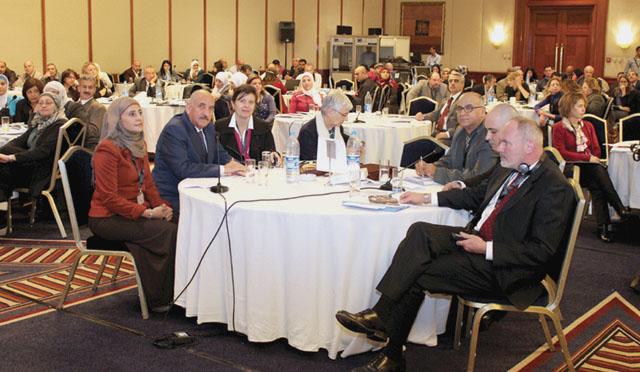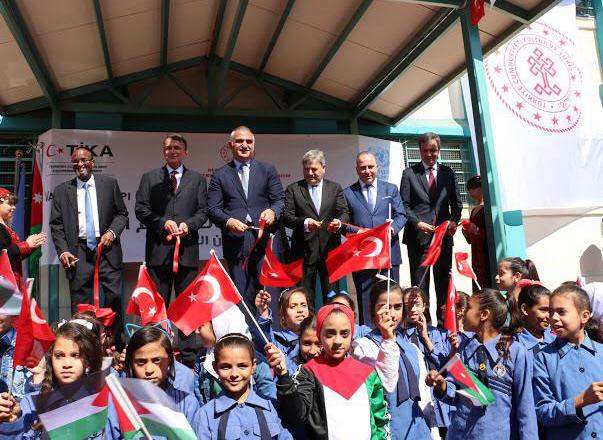You are here
World Bank report says resilience approach in UNRWA schools behind student excellence
By Laila Azzeh - Nov 12,2014 - Last updated at Nov 12,2014

AMMAN — Palestinian refugee students have managed to place themselves among the highest-achieving pupils at the international level, winning the battle against afflictions and deprivation, according to a World Bank Group (WBG) study.
Despite the challenges, students at UNRWA-run schools in the agency’s five fields of operations — Jordan, Syria, the West Bank and Gaza — are “achieving higher-than-average results in international assessments”, such as the “Trends in International Mathematics and Science Study” and the “Programme for International Student Assessment”, the report said.
Titled “Learning in the Face of Adversity: The UNRWA Education Programme for Palestine Refugees”, the study sheds light on a particular strategy followed by UNRWA schools that led to the “distinguished” results — resilience.
“The report highlights how a resilience approach that includes effective classroom practices of teachers, strong school leadership, assessments and shared accountability for learning can support adoptability and performance in high-risk contexts,” the WBG said.
With the report aiming to identify the points of strength in UNRWA’s education system — which involves 500,000 students, 700 schools and 17,000 teachers — authors of the study underlined the significance of such a move in inspiring governments of Palestinian refugee-host countries to follow suit.
“UNRWA students perform better than their peers in public schools despite their socioeconomic disadvantages and parents’ education, which seems to be compensated by students’ self-confidence, parental support and involvement in school activities,” said Harry Patrinos, the WBG’s education practice manager for the Middle East and North Africa.
At a press conference on Wednesday to announce the results of the study, Patrinos noted that the survey focused on UNRWA schools in Jordan, Gaza and the West Bank.
“Thus, the findings represent factors that appear to be working within a system, but they do not imply that the system as a whole is achieving positive results; that would require additional data collection and analysis for Lebanon and Syria,” the report said.
The main results of the survey show that UNRWA schools “continually and consistently outperform public schools by a margin equivalent to more than one additional year of learning”.
This is due to many factors, but mainly because UNRWA schools have “created a distinguished learning community centred on the student”, noted Patrinos.
The study noted that UNRWA selects, prepares and supports its education staff to pursue high learning outcomes, and teachers at agency-run schools are more satisfied with their jobs compared to public school educators.
The satisfaction rate among teachers of public schools in Jordan, Gaza and the West Bank stood at 51 per cent, compared with 75 per cent among UNRWA teachers.
“Moreover, the study showed that the higher achievements of UNRWA schools are realised with lower unit costs and with unstable funding that fluctuate from one year to another,” said the study’s co-author, Husein Abdul Hamid, who is also a senior education specialist at the WBG.
The report also indicated that UNRWA schools are part of a wider community and culture of learning that supports the child and ensures that the education received is meaningful and relevant.
“UNRWA teachers and students are not isolated from local communities,” Abdul Hamid added.
UNRWA is promoting and gauging a set of opportunities that support its students to “navigate” the adversities they face, according to the report.
As a result of the study, the WBG is working with countries in the region to support the implementation of UNRWA-like education systems.
Indicating that Jordan has made significant strides in reforming education, the WBG experts urged the government to benefit from UNRWA’s education system, especially in addressing the pressure on public schools due to the growing number of Syrian students.
Commenting on the study, UNRWA Director of Education Caroline Pontefract noted that evidence-based policies have been put in place to reach inclusive education.
“UNRWA schools continue to operate in an increasingly challenging environment, with many of our children exposed to conflict on a daily basis,” she said.
Related Articles
AMMAN — Ahmad Tayeb, a General Secondary Education Certificate Examination (Tawjihi) student and a cancer patient who took his examinations
Political instability and internal conflicts in the region create an urgent need for developing quality-sustainable education programmes for emergency situations, experts said on Sunday.
AMMAN — The United Nations Relief and Works Agency for Palestine Refugees in the Near East (UNRWA) in Jordan and the Turkish Cooperation and


















